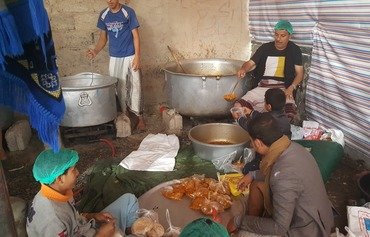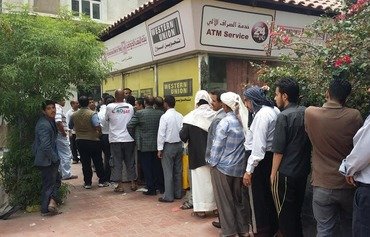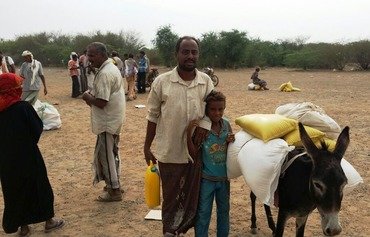Just before the holy month of Ramadan began, a group of Sanaa business leaders set up a food bank to fight hunger amid an increase in poverty brought on by the war that has sparked international concerns about a famine.
Members of the Chamber of Commerce and Industry and the Sanaa administrative district council inaugurated the food bank on May 24th as a non-governmental organisation (NGO) concerned with fighting hunger in Yemen.
Pledges so far total more than 300 million Yemeni riyals ($1.2 million).
Sanaa council secretary general Amin Jumaan applauded the efforts of the business leaders who established the food bank, and called on international and humanitarian organisations to join in supporting and ensuring its success.
![Sanaa business leaders take part in the May 24th inauguration of a new food bank established to fight hunger in Yemen. [Fouad al-Harazi/Al-Mashareq]](/cnmi_am/images/2017/06/08/8145-dsc_3533-600_384.jpg)
Sanaa business leaders take part in the May 24th inauguration of a new food bank established to fight hunger in Yemen. [Fouad al-Harazi/Al-Mashareq]
Social responsibility made it necessary for the private sector to play an active role in fighting hunger, said Sanaa Chamber of Commerce and Industry vice-president Sheikh Mohammed Salah, who chairs the food bank’s supreme council.
Food bank activities commenced during Ramadan, he told Al-Mashareq, with a number of projects supported by Chamber of Commerce members who own kitchens and bakeries to distribute food to the needy.
"Reaching the targeted [recipients] will be accomplished through the development of a hunger map based on field surveys and studies to assess the living conditions of the targeted [recipients]," Salah said.
'Ready-made foods and meals'
The food bank was established through the initiative of an individual from the commercial sector, who contributed funds to finance it, said Sanaa Chamber of Commerce and Industry executive director Khalid al-Alafi.
"The private sector is allocating a portion of the money that goes for payment of zakat and other [dues] to feed the poor and needy," he told Al-Mashareq.
The idea to establish a food bank emulates similar experiences in other Arab countries, Al-Alafi said while taking into account Yemen’s particularity.
While other countries primarily distribute dry goods, "in Yemen, through the food bank, we are trying to distribute ready-made foods and meals", he said.
This is because many people -- including internally displaced persons (IDPs) or those who lost their homes in the war -- do not have the equipment they need to cook food, he said.
"Families who have the means to cook will receive dry foods to prepare their own meals," he added.
Food bank organisers have been reaching out to restaurants and banquet organisers, asking them to donate surplus food so the bank can redistribute it, al-Alafi said.
"We also co-ordinate with merchants to donate food that expires in one month which they cannot sell or profit from, so we may redistribute these items to targeted [recipients] who are able to prepare their own meals," he said.
Food bank an 'excellent gesture'
"The poor and war-affected are optimistic about the role of the bank, especially during the holy month," al-Alafi said, expressing his own optimism about the role of the food bank in helping to alleviate the burden on those it serves.
On the first day alone, Chamber of Commerce and Industry members pledged 50 million Yemeni riyals ($200,000) to the food bank, with pledges from merchants now totaling more than 300 million Yemeni riyals ($1.2 million).
Yemen's ongoing war has exacerbated the suffering of Yemenis, as it halted production and triggered heavy job loss in the private sector, economist Abdul Jalil Hassan told Al-Mashareq.
Meanwhile, public sector employees have not received their salaries in about eight months, he said, which has had an impact on their living conditions.
Hassan said the establishment of the food bank was an "excellent gesture" by the commercial sector, as seven million Yemenis are on the brink of famine and 17 million others are food insecure, according to UN reports.

![A Yemeni boy sits on a food aid bag distributed by a local charity during the Muslim holy fasting month of Ramadan, in the capital Sanaa, on June 7, 2017. [Mohammed Huwais/AFP]](/cnmi_am/images/2017/06/08/8144-000_pc45g-600_384.jpg)







ِAn excellent initiative. We want to work with you in this excellent work.
Reply2 Comment(s)
I'm among the very needy.
Reply2 Comment(s)